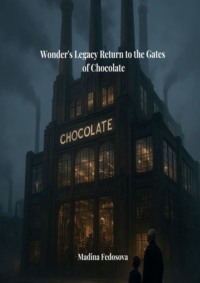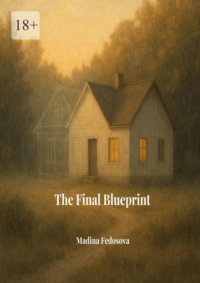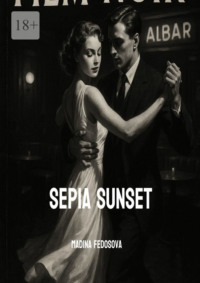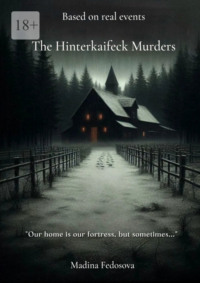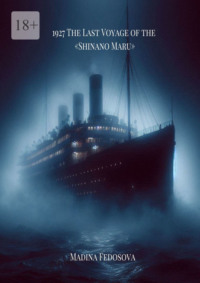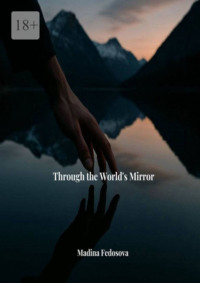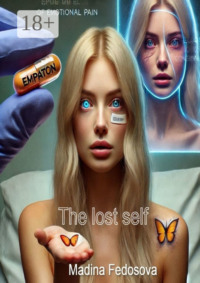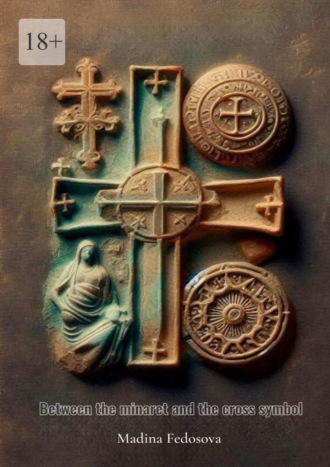
Полная версия
Between the minaret and the cross symbol
They moved through the tunnel, stumbling and bumping into the damp walls, like blind kittens wandering in a maze. Thick moisture hung in the air, soaking their clothes and skin. Each step echoed in the narrow space, creating the feeling that they were being pursued.
After a while, which seemed like an eternity to Alexander, they came to a narrow well leading to the surface. Iron staples went up, hammered into the wall of the well, like steps leading to salvation.
Amir was the first to start climbing the staples, his movements were quick and confident. David followed, helping Alexander find a foothold. Alexander, feeling his muscles aching, his hands trembling, began to climb after them, overcoming the fear of heights and fatigue.
Finally, exhausted and soaked to the skin, they got to the surface. It turned out that they were in the old Arab quarter, away from the Temple Mount, in a narrow alley, between two dilapidated houses. The night air was fresh and cool, like a breath of life after the stuffy and gloomy dungeon.
«We got away,» Amir sighed in relief, wiping the sweat from his brow. «This time. But we can’t relax. They will be looking for us.»
«What was that?» Alexander asked, trying to catch his breath and gather his thoughts. «Who are you? Why are they hunting you? And what were you doing there, under the Temple Mount?»
Amir and David exchanged glances, as if exchanging unspoken words. Their eyes revealed determination and mystery.
«We are those who seek the truth,» Amir replied, his voice sounding quiet but firm. «And we are ready to risk everything to find it. This truth can change the world, but many do not want it to come to light.»
«But what did you find there, at the excavations?» Alexander insisted, his curiosity flaring up with renewed vigor. «What is hidden there? What is so valuable that you are being hunted like this?»
David paused, as if weighing each word before answering.
«We saw ancient symbols there,» he said. «Symbols that unite Islam and Christianity. Symbols that prove that we have common roots, that our religions came from the same source.»
«What kind of symbols?» Alexander craved details. He felt excitement wash over him. Could they have found something that really could turn history upside down?
«It’s a complicated question,» Amir replied, his voice sounding evasive. «We can’t tell you everything right now. It’s too dangerous. But if you want to know the truth, if you really want to help us, you must trust us. And be ready for anything. Because those who hide this truth will stop at nothing to stop us.»
Alexander looked at Amir and David, trying to penetrate their thoughts, to understand what they were hiding behind their mysterious glances. He felt that they were holding something back, that there was much more behind their words than they were willing to reveal to him. But he also understood that they were his only hope of uncovering the mystery that had haunted him for so long. He stifled his doubts, deciding to trust his intuition.
«I trust you,» he said, looking them straight in the eyes. «What’s next? What should we do?»
«Next, we must leave Jerusalem,» David replied, his voice sounding serious and worried. «It’s too dangerous here. We are already being hunted, and staying here is certain death. We need to find a place where we can safely study these symbols, where the agents of the government and religious fanatics will not get to us.»
«Where are we going? Where can we hide?»
«To Syria,» Amir replied, his gaze becoming thoughtful. «There, in one of the ancient monasteries lost in the mountains, lies the key to solving this mystery. This monastery is a real treasure trove of knowledge; its archives contain ancient manuscripts and scrolls that can shed light on the origin of these symbols and their true meaning. The monks of this monastery are the guardians of ancient traditions and secrets; they have been protecting knowledge for centuries that can change the world. But the road to Syria will not be easy. There is a war going on there now, and getting to the monastery will be extremely dangerous. We will have to cross borders, avoid checkpoints, and take shelter from bombings. But if we want to know the truth, we must take the risk. In Syria, we will find not only danger, but also hope. The hope that we can find answers to our questions and uncover the mystery that unites Islam and Christianity.»
They fled, like thieves in the night, leaving behind Jerusalem, the sacred city, which had become a death trap for them. Alexander watched through the taxi window as the night city, like a mirage woven from lights and shadows, gradually melted into the rearview mirror, turning into a memory full of danger and mysteries. Adrenaline, which had recently been surging in his blood like a rushing stream, gradually receded, leaving behind only exhausting fatigue and gnawing anxiety. He felt like a squeezed lemon, exhausted physically and mentally.
Nearby, in the back seat, sat Amir and David, immersed in silence. They seemed detached from what was happening, as if they were somewhere far away, in their own thoughts. Alexander felt their wariness, their hidden tension, as if they were constantly expecting an attack. Who were they really? Allies sent by fate to help him uncover the mystery, or a cleverly laid trap, part of a complex game in which he was just a pawn? He couldn’t trust them completely, but turning away from them now would mean condemning himself to certain death. He found himself in the position of a person walking on thin ice, where every wrong step could lead to disaster.
«We are those who seek the truth,» Alexander repeated to himself, trying to understand the true meaning of this phrase. But what is hidden behind these words? What hidden motives, what personal goals do these two pursue, risking their lives for ancient secrets, for certain symbols found in the catacombs beneath the Temple Mount? Alexander wondered: what is the price of this truth? And is he ready to pay it, even if it costs him his life?
Yesterday’s escape from under the Temple Mount now seemed to him like a wild dream, terrible and incredible. As if in delirium, he again and again scrolled through all the events in his memory, starting from the anxious whisper of Amir at the wall overgrown with ivy, and ending with the rapid escape in the narrow corridors. Alexander recalled the cries of the guards, their angry faces, the narrow, dark corridors, smelling of dampness and mold, and the icy water of the ancient aqueduct, burning his skin. He felt in his memory every heartbeat, every drop of sweat, every breath taken on that day.
And most importantly – those strange, mesmerizing symbols, which they managed to see in the flickering light of the lamps, as if snatched from the depths of centuries, mysteriously shining in the twilight. Symbols, in which, according to David, the key to solving the mystery of a common faith is hidden, a mystery capable of changing the world. Alexander understood that it was these symbols, this mystery, that had now become for him the only goal, the only meaning of existence.
«What symbols?» This question gnawed at Alexander’s brain, like a pesky fly, not giving him a minute’s peace. It was as if he was stuck on repeat in his head, interrupting all other thoughts. He repeatedly tried to imagine what these signs could be, uniting two such different, warring religions. David promised to tell everything later, when they were in a safe place, but his evasiveness, his constant reservations only increased Alexander’s suspicions, making him doubt the sincerity of his companions.
The car sped down the highway, slicing through the night darkness, carrying them away from Jerusalem, a city full of secrets and dangers, into the unknown, into a country engulfed in war. Alexander did not know what awaited him ahead, what trials he would have to go through, what dangers lurked at every step. But he knew one thing: he could not stop, could not back down. He had gone too far, had gotten too close to solving the mystery, to turn back now. He felt that something unknown, but powerful, was pulling him forward, like a magnet, attracting him to the unexplored, to the disclosure of the truth, which might change his life forever.
«Where are we going?» Alexander asked, breaking the oppressive silence that reigned in the car. His voice sounded a little hoarse, betraying fatigue and tension.
«To Damascus,» Amir replied, his gaze fixed ahead, into the darkness of the night. «From there we will go to one of the ancient monasteries, lost in the mountains, far from cities and human eyes.»
«There is a war going on in Syria now,» Alexander reminded, anxiety in his voice. «It’s dangerous. There are constant battles, bombs exploding, people dying.
«We know,» David nodded, his eyes meeting Alexander’s for a moment. «But this is the only way to get to what we’re looking for. There’s no other way. The monastery is located in a remote area controlled by rebels. It is impossible to get there legally.»
Alexander imagined Syria, a country torn apart by war, a country where the ruins of cities coexist with ancient monuments, where despair and hope are intertwined in a bizarre pattern. He saw in his imagination the burnt-out skeletons of houses, the walls riddled with bullets, the tearful faces of women and children who had lost everything. He heard the roar of planes, the whistle of falling bombs, the cries of the wounded and the mourning for the dead. He felt the smell of burning, blood, and death hanging in the air. Syria appeared to him not just as a geographical point on the map, but as a living organism, bleeding, suffering, and fighting for survival. The upcoming journey seemed to him like a road to hell, a journey into the very heart of darkness. Shivers ran down his skin at the very thought of it. He understood that they were facing not just an adventure, but a real struggle for survival in a world where there is no place for mercy and compassion.
Alexander did not argue, although anxiety and fear squeezed his heart in an icy fist. He understood that he, in essence, had no choice. He had voluntarily linked his fate with these two people, trusted them, trusted his intuition, which suggested that they knew the answers to the questions that tormented him. He trusted, in the end, his faith that he was on the right track, that he must go this path to the end, despite all the dangers and difficulties.
The road to Damascus took almost the entire day. They drove through desolate landscapes, scarred by war, past dilapidated villages, abandoned cars, and checkpoints where armed men in dirty uniforms suspiciously examined their documents. Alexander felt the tension rising with every kilometer, as the air thickened, as if before astorm. He saw in the eyes of Amir and David the same anxiety, the same determination as in his own. They were driving into the very heart of the war, into a city where death lurked at every corner, and each of them understood this.
At the border, they were stopped by soldiers, dressed in battered uniforms, their faces, exhausted by the war, expressed no emotions. Riflemen warily watched their every movement, as if expecting a trick. They carefully checked the documents, meticulously studying every seal, every signature, as if looking for the slightest discrepancy. They asked tricky questions, trying to expose lies, provoking mistakes. Alexander tried to remain calm, maintain a composed appearance, not betraying his inner turmoil, which was ready to burst out. He felt sweat trickling down his back, his mouth drying up, his heart pounding wildly, ready to jump out of his chest. He understood that their life depended on their composure and ability to convince. Fortunately, after long and agonizing minutes of waiting, everything was fine. The soldiers, finding nothing suspicious, reluctantly returned their documents and let them through. Alexander sighed in relief, feeling the tension slowly receding.
By evening, they reached Damascus. The city was full of refugees fleeing the war.
The streets of Damascus were filled with chaos and poverty, a picture as if descended from the canvases of apocalyptic artists. Destroyed buildings, yawning with black voids of windows, resembled skulls eaten away by time, silently testifying to the destructive power of war. Piles of garbage, dumped right on the sidewalks, blocked the way, exuding a suffocating stench of rotting organic matter and burned plastic. Children, barefoot and dressed in rags, rummaged through these wastes, like hungry chicks, looking for at least something edible. Their faces, smeared with dirt, expressed unchildlike fatigue and despair.
Alexander stopped near one of the piles of garbage, unable to tear his gaze away from a little girl, desperately fighting a dirty dog for a scrap of bread. «Amir, look,» he whispered, feeling a lump rise in his throat. «We have to do something.»
Amir sighed heavily, looking at this scene. «We can’t help everyone, Alexander,» he replied. «If we give money to every needy person, we will be robbed, and it won’t help them. What’s needed here is not handouts, but peace.»
David approached them, holding two bottles of water. «I saw a shop nearby,» he said. «I bought water and some bread. It’s a little, but it’s better than nothing.»
He went to the girl and offered her bread and water. The girl, looking around in fright, grabbed the food and immediately disappeared into one of the back alleys.
Nearby, on the rubble of a destroyed building, sat an old man, a legless invalid, playing an old, out-of-tune violin. His playing was sad and monotonous, as if lamenting the dead city.
«What’s wrong with him?» Alexander asked.
«He lost his legs in a bombing,» Amir replied. «Now he plays in the streets, trying to earn a piece of bread.»
«Do we have anything?» Alexander asked, turning to David.
David took out a few bills from his pocket and put them in the old man’s outstretched hand. The old man nodded gratefully, continuing to play his sad melody.
Armed men stood on every corner, dressed in uniforms of different colors, symbolizing warring factions. They suspiciously looked at passers-by, ready to use weapons at any moment. Alexander felt like an uninvited guest in this world of suffering, as if he had invaded someone else’s tragedy, as if he was not worthy of this grief. He felt ashamed of his well-fed and peaceful life, of the world that he had left behind.
«We must be careful,» Amir repeated, looking around with concern. «It’s dangerous here. This city is a powder keg, ready to explode at any moment. We need to find a safe place, hide from prying eyes, and contact our people. They will help us get to the monastery.»
Amir and David brought Alexander to an old, dilapidated house in one of the poorest and most abandoned quarters of Damascus. The house seemed to breathe history, but this history was full of suffering and deprivation. Cracks spread like cobwebs across the walls, peeling paint exposed the brickwork, and crooked windows with broken glass let in drafts and the noise of the city. Here, in a cramped room, furnished with old, worn furniture, they were to spend several days, preparing for a further, even more dangerous journey. The room smelled of dampness, mold, and dust; it seemed as if time had stopped here.
«We will be safe here,» Amir assured, examining the room. «No one will look for us in this godforsaken place. No one will find us here. The locals keep to themselves and don’t like strangers, so we won’t attract attention. Try not to go outside unless necessary and don’t talk to strangers. The less attention we draw to ourselves, the better.»
Alexander looked around. The room really seemed gloomy and uncomfortable, like a reflection of the hopelessness that reigned outside its walls. The dim light, penetrating through the dirty windows, thickened the shadows, making the objects even more sinister. The old furniture, covered with a layer of dust, seemed alien and uncomfortable. In the corner stood a lopsided closet, from which the paint was peeling, and stains of mold were visible on the walls. The smell of dampness and mustiness permeated everything, penetrating clothes and skin. But Alexander didn’t care. After what he had experienced, after the escape from under the Temple Mount, after a road full of dangers and deprivations, this room seemed to him like a paradise. The main thing was that he was alive. And he was on his way to his goal, to solving the mystery that occupied all his thoughts. The gloomy surroundings did not matter, because his spirit burned with a thirst for knowledge, and nothing could stop him.
In the evening, when it got dark and the room was plunged into twilight, lit only by the dim light of a kerosene lamp, David brought several old books and scrolls, tied with a yellowed rope. He put them on the table, covered with dust and crumbs, and looked at Alexander with a serious expression on his face.
«Here,» he said, handing them to Alexander. «Study. Here you will find answers to your questions. Here are collected ancient texts, legends, and traditions that can shed light on the mystery of the symbols we saw under the Temple Mount. But be careful, Alexander. This knowledge can be dangerous. It can change your perception of the world, of religion, of life itself. Be prepared for what you learn may shock and disappoint you. And most importantly, don’t tell anyone about it. We don’t know who can be trusted and who cannot.»
Alexander took the books and began to examine them. These were ancient texts in different languages: Arabic, Greek, Latin. Some of them were handwritten, others were printed on old printing presses.
«What are these books?» Alexander asked
«These are books about ancient religions, about mystical teachings, about secret societies,» David replied. «In them you will find mentions of those symbols that we saw at the excavations.»
Alexander, with a sinking heart, opened one of the books. Its pages were yellowed with age, inscribed in calligraphic handwriting in ancient Aramaic. With each page, he was captured by the world of ancient secrets and mysteries, a world full of mysticism and mythology.
The first lines described the legend of King Solomon, who, according to legends, possessed not only wisdom, but also power over the jinn, the spirits of the desert. The book claimed that Solomon built the First Temple not only as a place of worship to God, but also as a repository of ancient knowledge, passed down from generation to generation from Adam himself.
The book stated: «King Solomon, may blessings be upon him, was not only famous for his wisdom, but also for his power over the jinn, the spirits of the desert. And he erected the First Temple not only as a place of worship to the Most High, but also as a repository of secret knowledge, passed down from Adam, our ancestor, from generation to generation.»
Further on, there were descriptions of various symbols, many of which were familiar to Alexander from Christian and Islamic iconography: the cross, the crescent, the Star of David, the Eye of Horus… But in the book, as if in a mirror, they appeared in a different light, their usual meanings disintegrated, revealing new, deeper, and more unexpected meanings. Each symbol, like a key, opened the door to a labyrinth of ancient knowledge, forcing a rethinking of familiar concepts of faith and the universe. But in the book, they were given a different, deeper meaning.
The Star of David, for example, was considered not just as a generally accepted Jewish symbol, but as a graphic representation of the deepest cosmogonic principle. Two equilateral triangles, one pointing apex upwards, and the other – downwards, symbolized the interaction of male and female principles, active and passive, heavenly and earthly. The upper triangle, representing the masculine principle, symbolized the striving for the spiritual, for ascension, for the knowledge of higher truths. The lower triangle, representing the feminine principle, symbolized the material world, acceptance, fertility, and connection with the earth. The connection of these two triangles into a single figure, the Star of David, symbolized harmony and balance, the achievement of perfection through the unification of opposites. It was not just a decoration, but a living mantra, a formula of the universe, enclosed in graphic form.»
The crescent moon, traditionally revered as a symbol of Islam, appeared in the book not simply as an indication of the lunar calendar or a connection with the moon goddess of ancient Arab beliefs. It was interpreted as a symbol of knowledge, as a bowl ready to receive the wisdom of the Universe. The curved shape of the crescent moon symbolized receptivity, openness to new knowledge and experience. It was presented as a vessel filled with the light of spiritual truth, as a reflection of divine wisdom in the human consciousness. The crescent moon was not just a sign of faith, but an invitation to constant searching, to tireless self-improvement, and to the pursuit of knowledge of the mysteries of the universe. It was a symbol of the disciple, ready to listen and absorb knowledge, as the earth absorbs life-giving moisture.
The crescent moon, traditionally revered as a symbol of Islam, appeared in the book not simply as an indication of the lunar calendar or a connection with the moon goddess of ancient Arab beliefs. It was interpreted as a symbol of knowledge, as a bowl ready to receive the wisdom of the Universe. The curved shape of the crescent moon symbolized receptivity, openness to new knowledge and experience. It was presented as a vessel filled with the light of spiritual truth, as a reflection of divine wisdom in the human consciousness. The crescent moon was not just a sign of faith, but an invitation to constant searching, to tireless self-improvement, and to the pursuit of knowledge of the mysteries of the universe. It was a symbol of the disciple, ready to listen and absorb knowledge, as the earth absorbs life-giving moisture.
And finally, concerning the symbol seen beneath the Temple Mount, the book stated: «This is the Key to Unity, a seal that binds all Abrahamic lineages. For Abraham, our forefather, was one, and the God whom he served is one. Various are the paths leading to Him, but the goal is one. And this symbol, like a bridge, connects the shores of different faiths, reminding us of brotherhood and a common heritage. He who sees its true meaning will find peace in his soul and understand that there is no enmity between the children of Abraham, but only misunderstanding, which can be overcome with love and wisdom.»
Special attention in the book was paid to the symbol engraved in the depths of the dungeons of the Temple Mount. It was described as the «Key to Unity,» as a graphic expression of the very essence of the Divine plan, as a symbol uniting all Abrahamic religions: Judaism, Christianity, and Islam. It pointed to their common roots, to the fact that they all originate from one source – the faith of Abraham, and that, despite differences in rituals and dogmas, they all ultimately lead to the same God, to the single source of the universe.
The book claimed that this symbol was deliberately hidden from human eyes, carefully guarded by secret societies, and kept in the depths of centuries. Its concealment was explained by the fact that its discovery could undermine the foundations of religious authority, destroy carefully constructed hierarchies, and lead to a rethinking of all of human history. If people realized that all religions, in essence, spoke of the same thing, that their differences were only a matter of interpretation and cultural context, then the need for wars and conflicts on religious grounds would disappear. But this was precisely the danger for those who ruled the world, manipulating the religious feelings of people. Disunity is easier to control, and unity carries within it the power to change the world.
Reading these lines, Alexander felt a wave of delight and fear sweeping over him, like a seafarer feels awe before the unknown, discovering new lands that promise riches and dangers. He felt that he was approaching a solution, that he stood on the threshold of a discovery capable of changing the world, just as a spark is capable of igniting dry gunpowder. But he also understood that this discovery could be dangerous, that it could provoke the anger of those who are interested in preserving the existing order, just as the light of day is hateful to those who are used to living in darkness.


